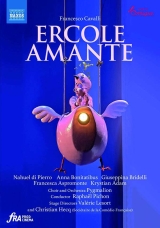 Francesco Cavalli: Nahuel Di Pierro, Anna Bonitatibus, Giuseppina Bridelli, Francesca Aspromonte, Krystian Adam, Pygmalion, Raphaël Pichon; 2 DVDs Naxos 2.110679-80; Aufnahme aus der Opéra Comique in Paris, 11/2019; Regie: Valérie Lesort und Christian Hecq; Stereo & Surround, Bild 16:9; Veröffentlichung 02/2021 (187') – Rezension von Remy Franck
Francesco Cavalli: Nahuel Di Pierro, Anna Bonitatibus, Giuseppina Bridelli, Francesca Aspromonte, Krystian Adam, Pygmalion, Raphaël Pichon; 2 DVDs Naxos 2.110679-80; Aufnahme aus der Opéra Comique in Paris, 11/2019; Regie: Valérie Lesort und Christian Hecq; Stereo & Surround, Bild 16:9; Veröffentlichung 02/2021 (187') – Rezension von Remy Franck
Francesco Cavallis Ercole amante, eine dreistündige Tragedia in einem Prolog und fünf Akten nach dem neunten Buch von Ovids Metamorphosen wurde am 7. Februar 1662 im Théâtre des Tuileries in Paris uraufgeführt.
Mazarin hatte Cavalli, den berühmtesten italienischen Opernkomponisten der Zeit, beauftragt, eine prächtige Oper zu schaffen, in der der junge König Ludwig XIV. als antiker Held dargestellt und gleichzeitig seine amourösen Tugenden verherrlicht werden sollten.
Ercole Amante – Herkules in der Liebe -, ist in der Tat ein außergewöhnliches Werk: Herkules, der Ehemann von Deianira, ist in die hübsche Iola verliebt ist. Iola wird auch von ihrem Sohn Hyllus geliebt. Venus, die die Liebe begünstigt, und Juno, die die Ehe schützt, versuchen in diesem Liebesgeplänkel die Oberhand zu behalten.
Die frische und kecke Inszenierung von Valérie Lesort und Christian Hecq sowie Vanessa Sannino, die für die farbigen, lustig-kitschigen Kostüme und Requisiten, die lustigen Puppen sowie die unglaublich effektvolle Maschinerie verantwortlich zeichnet, bringt mit viel Fantasie sehr starke Bilder in die barocke Oper. An technischem Aufwand wurde nicht gespart, um der üppigen und prachtvolle Musik Cavallis mit einer nicht weniger üppigen Inszenierung in bestem Fantasy-Charakter zu begegnen.
Raphaël Pichon ist mit seinem Ensemble Pygmalion ein brillanter Sachwalter der Musik, die sich in ihrer ganzen affektreichen Pracht entfaltet.
Die Hauptrollen sind ganz exzellent besetzt. Gleich bei seinem ersten Auftritt beeindruckt Nahuel di Pierro mit seiner kraftvollen, perfekt artikulierenden und kernig-klaren Bassstimme in der Titelpartie. Anna Bonitatibus, die bereits in der Produktion der Nederlandse Opera zu hören war, singt die Göttin Juno mit warmer, wohlklingender Mezzosopranstimme, während die brillante Sopranistin Francesca Aspromonte als Iole vollauf überzeugt. Mit seinem feinen, edlen Tenor begeistert Krystian Adam als Hyllo. Die kleineren Rollen sind ebenfalls ausnahmslos gut besetzt.
Und so vereinen sich Bild und Ton zu einem audiovisuell perfekten Bühnenwerk, wie man es sich beglückender nicht wünschen kann. Augen und Ohren kommen jedenfalls hier voll auf ihre Kosten.
Francesco Cavalli’s Ercole amante, a three-hour tragedia in a prologue and five acts based on the ninth book of Ovid’s Metamorphoses, was premiered at the Théâtre des Tuileries in Paris on February 7, 1662.
Mazarin had commissioned Cavalli, the most famous Italian opera composer of the time, to create a magnificent opera that would portray the young King Louis XIV as an ancient hero while glorifying his amorous virtues.
Ercole Amante – Hercules in Love -, is indeed an extraordinary work: Hercules, the husband of Deianira, is in love with the beautiful Iola. Iola is also loved by her son Hyllus. Venus, who favors love, and Juno, who protects marriage, try to keep the upper hand in this love skirmish.
The fresh and perky staging by Valérie Lesort, Christian Hecq and Vanessa Sannino, who is responsible for the colorful, fun and kitschy costumes and props, the funny puppets as well as the incredibly effective machinery, brings very strong images to the baroque opera with a lot of imagination. No expense has been spared on the technical side in order to counter Cavalli’s lush and magnificent music with a no less lush staging in the best fantasy character.
Raphaël Pichon and his ensemble Pygmalion are brilliant performers of the music, which unfolds in all its affect-rich splendor.
The leading roles are cast quite excellently. Right at his first appearance Nahuel di Pierro impresses with his powerful, perfectly articulating and pithy bass voice in the title role. Anna Bonitatibus, who has already been heard in the Nederlandse Opera production, sings the goddess Juno with a warm, melodious mezzo-soprano voice, while the brilliant soprano Francesca Aspromonte is fully convincing as Iole. With his fine, noble tenor, Krystian Adam thrills as Hyllo. The smaller roles are also without exception well cast.
And so image and sound unite to create an audiovisually perfect stage work that could not be more pleasing. Eyes and ears, at any rate, get their money’s worth here.
























